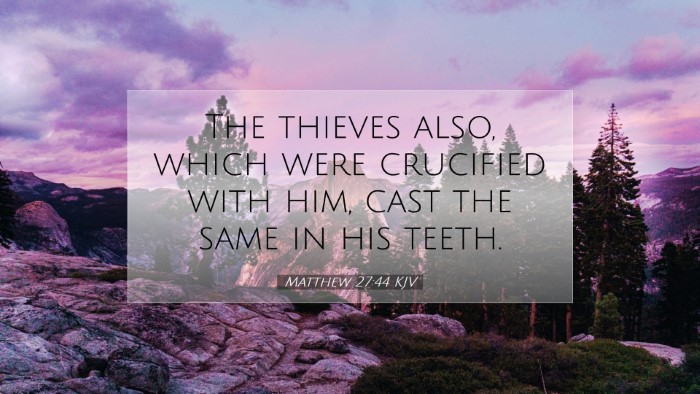Bible Commentary on Matthew 27:44
Verse Context: Matthew 27:44 (KJV) states, "The thieves also, which were crucified with him, cast the same in his teeth." This verse records a pivotal moment during the crucifixion of Christ, highlighting the scorn and mockery directed at Him even in His hour of greatest suffering.
General Overview
This passage reflects the deep humiliation that Jesus experienced on the cross. Not only was He tortured physically, but He was also subjected to mockery and derision. The presence of the two thieves crucified alongside Him serves to amplify the disdain aimed at Him, establishing the intensity of His suffering.
Insights from Public Domain Commentaries
Matthew Henry's Commentary
According to Matthew Henry, this verse showcases the fulfillment of prophecy, as the Messiah was to be "numbered with the transgressors" (Isaiah 53:12). Henry notes that the craft and wickedness of man were prominently displayed as they, both onlookers and fellow sufferers, derided the Savior. This illustrates the general perception of Jesus as a sinner, reinforcing the injustice of His trial and execution.
Henry emphasizes the spiritual blindness that led the thieves to join in the mockery. Despite their own guilt and impending death, they could not recognize their own need for salvation, nor the innocence of Christ. This serves as a mirror for humanity's fallen state, where even in suffering, people often lash out rather than seek redemption.
Albert Barnes' Notes on the Bible
Albert Barnes further examines the mocking words of the thieves as reflecting the general contempt of the crowd towards Jesus. His commentary remarks on the nature of the crucifixion: it was not merely a death sentence but an act of public disgrace. Barnes highlights that one of the thieves later rebukes the other, recognizing Christ's innocence (Luke 23:39-43), which reveals a transformative moment amidst the derision.
Barnes notes that this passage calls attention to the propensity of humanity to join in collective condemnation, often without understanding true justice or righteousness. He suggests that the ultimate purpose of this moment is to demonstrate Christ's profound love and forgiveness, even toward those who wronged Him.
Adam Clarke's Commentary
Adam Clarke provides a detailed analysis of the social and cultural implications of this interaction at the crucifixion. He remarks on how crucifixion was a punishment reserved for the worst offenders and that by associating with thieves, the message of Christ's divine origin was further obscured in the public eye.
Clarke points out the irony of the thieves’ initial mockery; they, being upon the same path of punishment, reflected the human tendency to project blame onto the innocent rather than confronting their own guilt. He provides insights into the environment of that time, where the act of crucifixion was designed not just to inflict pain but to communicate a message of fear and revulsion to the populace. Christ's reaction—or lack thereof—further serves to reveal His mission of salvation which transcends His immediate suffering.
Theological Reflections
This verse invites deep theological reflection on the nature of suffering and the human condition. The mockery of Christ by the thieves speaks volumes about the human inclination to sin and the tendency to dismiss divine truth in favor of self-preservation. As theologians, one might ponder why Christ chose to endure such humiliation and what it means for believers today.
- Human Nature: The collective mockery at the cross mirrors the universal nature of sin and rebellion against God.
- Divine Mercy: The subsequent response of one of the thieves highlights the potential for redemption, illustrating that no one is beyond the reach of Christ’s grace.
- Fulfillment of Scripture: The events recorded fulfill prophecies concerning the Messiah, reinforcing the sovereignty of God over human affairs.
Conclusion
Matthew 27:44 serves as a profound reminder of Christ’s suffering, the rejection He faced, and the hope found in His mission. The comments from biblical scholars lay a foundation for understanding this pivotal moment in the passion narrative. For pastors and theologians, these insights underscore the gravity of Jesus’ sacrifice and encourage reflection on the depths of redemptive love that came to fruition at the cross. As believers, it prompts a call to humility, repentance, and an acknowledgment of our shared humanity.


